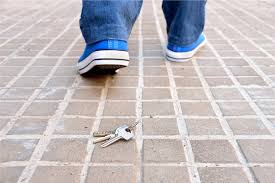A young doctor I know loses the key to his apartment with staggering consistency—several times a month. He academic abilities are prodigious: he was graduated near the top of his class in medical school and can recite differential diagnoses more effectively than I can remember the names of my own children. His compendium of medical knowledge is Rain Man-level, bordering on idiot savant. His ability to remember where he left his keys is also spectacular. But not in a good way.
His record for losing his keys is twice in one week.
Which could lead to life threatening consequences in these pandemic infused times. “Where is the doctor? He is due to scrub in for surgery!” “He says he can’t make it! He lost his keys again!”
Recommendations abound from concerned family and friends: He’s too cerebral. He’s lost in his own head. Other recommendations are less gracious: He should have been punished when he was younger. Logical consequences would cure him! And some advice is mutually contradictory. His parents were obviously too controlling and too lenient. (At the same time?)
Should this young man be stripped of his prescription pad? Should his license to practice medicine be revoked because—on a good day—it takes him over ten minutes to find his keys? Or is there a workaround?
Every few months he goes to the locksmith and makes ten copies of his keys. When he loses seven or eight sets, he goes back to the hardware store and makes ten more copies.
He spends about a hundred dollars a year. As a result, he is able to go about the business of saving lives.
Dr. Barbara Cordoni was an innovator in helping college students with learning differences. Dr. Cordoni founded one of the first college level programs—at Southern Illinois University==for students who learn differently. One of her 18-year-olds was embarrassed to buy groceries. Before the first year student spent all his money on pizza delivery or starved to death in his dorm room, Dr. Cordoni determined how to intervene. The student was embarrassed to write checks at the supermarket, because he didn’t know how to spell numbers: Forty? Fourty? Dr. Cardoni printed the correct spellings on a small paper for the young adult to keep in his checkbook. Problem solved.
Where are your children stuck? What is the workaround? Where is the metaphorical hundred dollar investment that pays spectacular dividends? Where is the solution as simple as printing the correct spellings on a piece of paper? How can loving parents encourage their children to achieve their potential?
I’m not talking about enabling, softening the blow, allowing children to obviate the logical consequences for their poor decisions. I’m suggesting that we remove stumbling blocks, allow our kids to achieve, lead their best lives.
There are still parents and educators in 2021 who believe that all children learn the same. Children who don’t study effectively are spoiled and unmotivated. Children choose not to learn.
Oh, please. What a 14th century idea—suggesting that all brains are the same, that there are no differences in how people learn. Get on the right side of history. Help your kids find a solution. Find a workaround. Encourage them to make extra keys. Make a note with proper spelling. Figure it out. Make it happen.
You could be allowing someone to save lives.








One thought on “Key Insight”
This made me smile! 🙂
The neurodiverse among us who think differently really benefit when we drop the judgement and find creative solutions to support them.